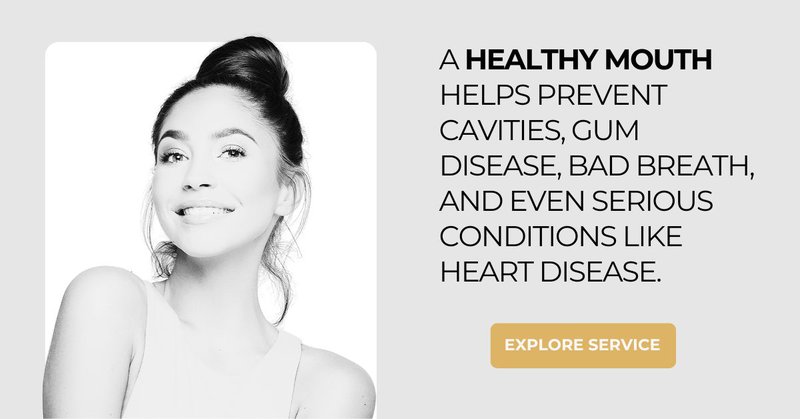Think brushing twice a day is enough? Not always. You might be skipping some important steps that help your mouth stay clean, your breath fresh, and your smile healthy. The goal is more than checking a box—it’s about protecting your teeth for the long haul. Let’s clear up what works, what doesn’t, and some healthy, practical tips for maintaining oral hygiene. Ready to see how your routine stacks up?
Key Takeaways:
- Brush teeth twice daily for two minutes using fluoride toothpaste and soft, circular strokes.
- Floss once daily using the “C” method to remove plaque between teeth; plaque hardens into tartar in 24–72 hours.
- Rinse with alcohol-free mouthwash after brushing and flossing to reduce bacteria and freshen breath.
- Replace toothbrush or electric head every 3–4 months or if bristles are frayed.
- Limit sugary and acidic snacks; choose cheese, nuts, carrots, and leafy greens instead.
- Visit the dentist every 6 months; schedule sooner if you have pain, bleeding, or loose teeth.
- Clean your tongue daily to reduce odor-causing bacteria.
- Drink water, avoid smoking, manage stress, and maintain oral hygiene throughout life.

Tips for Maintaining Oral Hygiene: A Complete Guide for a Healthier Smile
Keeping your mouth healthy is one of the most important habits you can build. Whether you’re trying to prevent cavities, freshen your breath, or protect your gums, practicing good oral hygiene every day makes a big difference. At Smile Dailey Dental, we help patients of all ages understand how to care for their teeth, gums, and overall oral health.
Your Daily Routine Should Include the Basics
Your morning and evening routines are the foundation of oral hygiene. Every day, brush twice and floss once. This helps remove plaque before it hardens into tartar, which only a dental professional can remove.
Follow this order for the best results: brush, floss, then rinse. Brushing effectively clears away most buildup; meanwhile, flossing tackles what’s stuck between teeth. Additionally, mouthwash finishes the job by rinsing away bacteria and debris.
Furthermore, at night, it’s important to be extra thorough. Since saliva production slows while you sleep, bacteria can consequently grow faster. In the morning, brushing not only removes overnight buildup but also leaves fluoride behind for continued protection throughout the day. If you’re not sure about your technique, take a moment to read about proper brushing and flossing in our Dental Services section.
Brushing Correctly Makes a Big Difference
Even if you’ve brushed your teeth your whole life, you might be missing key steps.
Use small circular motions for at least two minutes, twice a day. To begin, start at the back and gradually work your way forward. Next, hold your brush at a 45-degree angle to the gums, ensuring you brush every surface—front, back, and chewing areas. Additionally, don’t forget your tongue, where bacteria love to hide.
Replace your toothbrush (or head, if electric) every 3 to 4 months, or sooner if the bristles are frayed. Worn bristles can’t clean effectively and may irritate your gums.
Need more brushing guidance? Explore our blog for practical tips and tools.
Flossing Reaches Where Brushes Can’t
Flossing daily is one of the most important tips for maintaining oral hygiene. It effectively removes plaque and food particles from between your teeth and under your gumline—places where your brush simply can’t reach.
First, use about 18 inches of floss and carefully curve it into a “C” shape around each tooth. Then, gently slide it up and down, reaching just under the gumline. Finally, make sure to use a clean section for each tooth.
If traditional floss is tricky, try floss picks, floss holders, or a water flosser, especially if you wear braces or have limited dexterity. Water flossers are a great alternative when string floss isn’t practical, though string remains the most effective for sticky plaque.
Mouthwash Adds Extra Protection
Mouthwash isn’t a substitute for brushing or flossing, but it’s a great addition. Using mouthwash is an essential part of your oral care routine because it kills bacteria, freshens breath, and helps prevent cavities.
If your goal is to strengthen enamel, choose a fluoride rinse. Additionally, for enhancing gum health, go with an antiseptic mouthwash. Moreover, if you have a dry mouth or sensitivity, an alcohol-free option is ideal.
Furthermore, always look for products with the ADA Seal of Approval, as this ensures the rinse meets safety and effectiveness standards.
Tips for Maintaining Oral Hygiene: Choosing the Right Care Products Matters
The products you use at home can make a big impact on your oral health.
- Toothpaste: Pick one with fluoride to protect your enamel and help prevent cavities.
- Toothbrush: Choose soft bristles to avoid damaging enamel and gums.
- Electric or manual? Electric toothbrushes often clean better and make it easier to stick to the 2-minute rule.
Not sure which products are best for you? Ask us during your next visit. You can also browse our New Patient Information for more details on what to expect at your first appointment.
Your Diet Plays a Huge Role in Oral Health
What you eat affects your mouth as much as your body.
Tooth-friendly foods include cheese, leafy greens, carrots, nuts, and yogurt. These support strong enamel and stimulate saliva, which helps neutralize acids.
Sugary and starchy snacks feed bacteria, which then produce acids that eat away at your enamel. Sticky snacks like candy and crackers are especially harmful.
Try these smart snacking tips:
- Choose crunchy fruits and vegetables
- Drink water with snacks
- Limit how often you snack throughout the day
For more on nutrition and dental health, see the CDC’s fluoride and oral health resources.
Gum Health Deserves Extra Attention
Healthy gums are key to a healthy mouth. Even if your teeth seem fine, gum disease can sneak in quietly.
Watch for early signs like:
- Bleeding when brushing or flossing
- Swelling or redness
- Persistent bad breath
Brush along the gumline using circular motions with a soft-bristled brush. Floss daily, eat less sugar, and use alcohol-free mouthwash if you have dry mouth.
Schedule a dental visit if bleeding continues for more than a week. Gum issues can lead to tooth loss if ignored.
Dental Visits Should Happen Twice a Year
One of the most important tips for maintaining oral hygiene is seeing your dentist regularly. These visits catch small problems before they become big ones.
During your cleaning, we:
- Remove tartar
- Check for cavities
- Examine your gums
- Take X-rays if needed
Most people need a cleaning every six months, but some may need visits every 3–4 months, especially if they have diabetes, dry mouth, braces, or gum concerns.
If you notice pain, bleeding, swelling, or loose teeth, don’t wait—call us early.
More Tips for Maintaining Oral Hygiene: Fresh Breath Starts With the Basics
Bad breath often comes from bacteria hiding on the tongue, between teeth, or in dry spots.
Clean your tongue daily using your toothbrush or a tongue scraper. Drink plenty of water, and snack on crunchy foods like apples or celery to boost saliva.
Avoid:
- Garlic and onions
- Alcohol
- Tobacco
If bad breath continues, it could be a sign of gum disease or another issue. Let us know so we can help you find the cause and a solution.
Lifestyle Choices Affect Oral Health
Your overall habits influence your mouth.
- Smoking damages gums and stains teeth
- Alcohol dries the mouth and weakens enamel
- Stress can lead to grinding and skipped cleanings
Drink water throughout the day to keep your mouth moist and your saliva flowing. Consider sugar-free gum to help with dry mouth.
If stress is affecting your oral care, try relaxation techniques and talk to your dentist about managing its effects on your mouth.
Improving and Maintaining Oral Hygiene Needs Change With Life Stages
Different stages of life require different oral care strategies.
Children should learn to brush twice and floss once a day. Use a small amount of fluoride toothpaste and supervise brushing until they can do it well. Make it fun with music or brushing apps.
Pregnant people are more prone to gum inflammation and cavities. Brush and floss daily, rinse if you vomit, and see your dentist by the second trimester.
Older adults may face challenges like dry mouth or arthritis. Switch to thicker-handled brushes or water flossers for comfort. Dentures need daily cleaning too.
Explore age-specific guidance at the National Institute on Aging’s dental page.
Enamel Strength and Cavity Prevention Go Hand in Hand
Enamel is the hard outer layer of your teeth—but once it’s gone, it doesn’t grow back.
Protect it by:
- Brushing gently with fluoride toothpaste
- Avoiding acidic drinks like soda
- Waiting 30–60 minutes after eating acidic foods before brushing
- Drinking water after meals
Fluoride, calcium, and phosphate are key to remineralizing weak spots. Ask your dentist about fluoride treatments or special rinses if you’re prone to cavities.
Post-Treatment Care Supports Healing
After a dental procedure, follow your dentist’s instructions closely.
- Avoid hot drinks until numbness fades
- Eat soft foods for the first day
- Rinse with warm saltwater to soothe sore spots
- Avoid smoking, straws, and spitting after extractions
If you experience pain, swelling, or unusual symptoms beyond a few days, contact us. Early care leads to faster healing and fewer complications.
Final Tips for Maintaining Oral Hygiene: Small Steps Create a Lifetime of Healthy Smiles
Daily brushing and flossing. Smart food choices. Regular dental checkups.
Whether you’re teaching a child, adjusting to pregnancy, or managing senior care, oral hygiene evolves with you. And we’re here to help every step of the way.
Let’s Keep Your Smile in Top Shape
Start Your Healthy Smile Journey Today
At Smile Dailey Dental, we believe in simple, effective care that fits your life. From cleanings and exams to personalized hygiene tips, our mission is to help you smile with confidence. Whether you're looking to improve your daily routine or need expert support, we’re here for you. Contact us today to schedule an appointment or ask a question—we’d love to hear from you!

